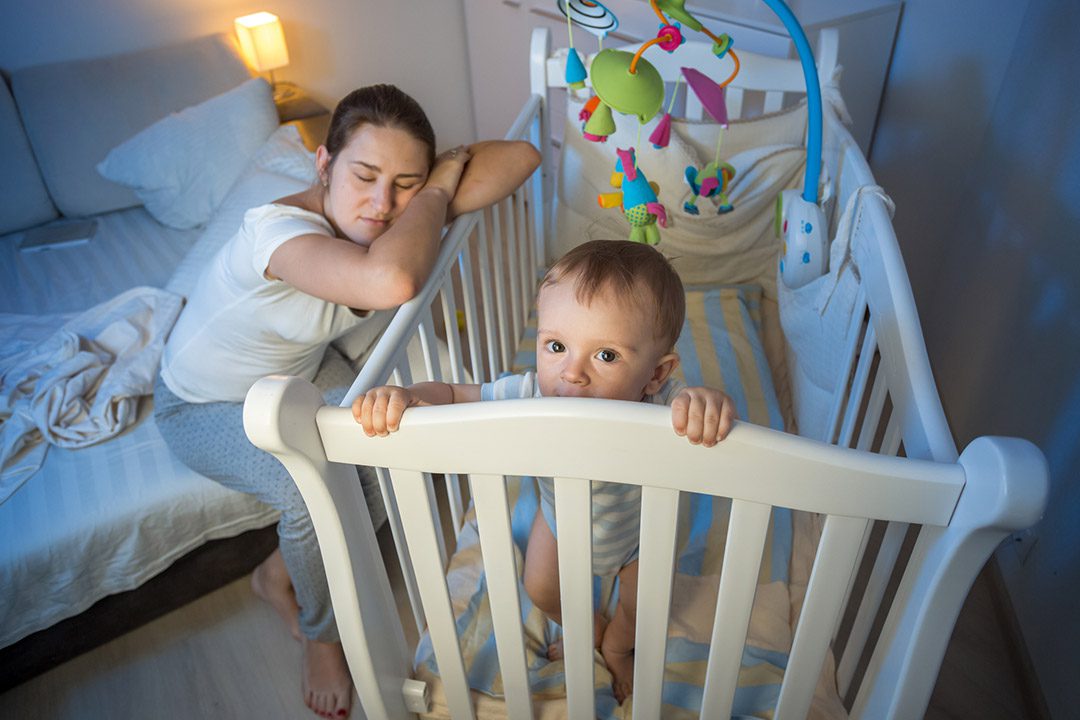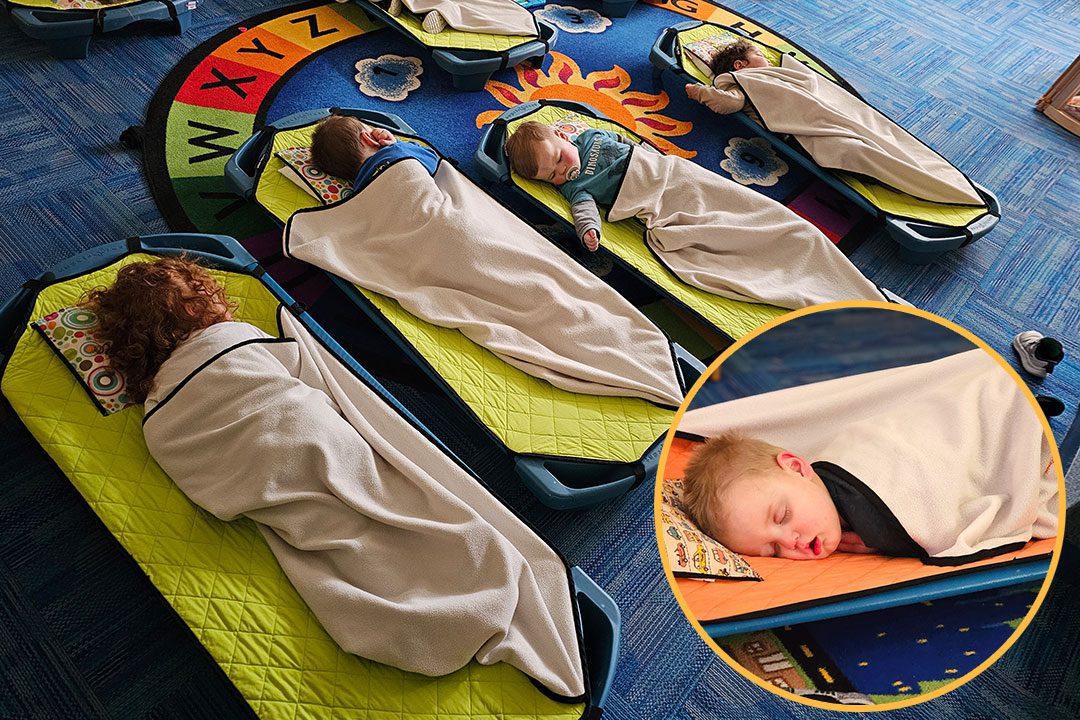Bedtime for children can be a memorable, magical time.
But if your child has difficulty getting to sleep, it can also be a challenge.
Parents with children who can’t sleep… become parents who can’t sleep. We all know that’s not a good thing for anyone involved. We’ve talked about how Early Advantage helps children get to sleep while at our center, but we also want to stress the importance that good sleeping habits at home will have on your child’s development and well being.
Plus, when they’re napping, you’ll have a chance to focus on other things. 😊
This resource will cover some habits and strategies for good sleep habits for babies, toddlers, and Pre-K children.

Babies: Bedtime Sleep Schedule for Comfortable Sleep
Swaddle Your Baby:
Swaddling can provide a comforting and secure feeling for your infant. Use a soft blanket to wrap your baby snugly, ensuring they feel safe and cozy as they settle down for the night.
Establish a Sleep Schedule:
Infants thrive on routine, so establish a consistent sleep schedule. This helps create a predictable rhythm for your child’s sleep habits, making bedtime a more restful experience.
A well-structured sleep schedule contributes to the development of good sleep habits that will benefit your child as they grow.
Give Your Baby Attention During the Day:
Offer plenty of attention and interaction with your baby during waking hours. Engaging in activities and providing care throughout the day helps create a sense of security, making it easier for your infant to transition into a calm sleep environment at night.
Establish a Bedtime Routine:
Introduce a calming bedtime routine to signal to your baby that it’s time to wind down. This can include activities like reading a bedtime story, gentle rocking, white noise, or singing a lullaby.
Creating a soothing atmosphere before bedtime helps your infant associate these rituals with falling asleep.
Place Your Baby in the Crib Before They Fall Asleep:
Encourage your baby to fall asleep independently by placing them in the crib while they are drowsy but still awake. This practice helps your infant learn self-soothing techniques, contributing to the development of good sleep habits.

Toddlers – Pre-K: A Bedtime Routine for Restful Nights
Helping toddlers and pre-K children develop healthy sleep habits requires a thoughtful and consistent approach to bedtime.
Establish a Consistent Bedtime:
Set a regular bedtime for your toddler. Consistency is crucial in helping them develop a reliable sleep schedule. This routine provides a sense of predictability, promoting a smoother transition to sleep each night.
Create a Relaxing Bedtime Routine:
Develop a calming routine before bedtime. Engage in activities that help your toddler wind down, such as reading a favorite story, taking a warm bath, or practicing gentle stretches.
Establishing calming rituals signals to your toddler that it’s time to prepare for sleep.
Limit Screen Time Before Bed:
Reduce exposure to screens before bedtime. The blue light emitted from electronic devices can interfere with melatonin production, affecting sleep quality. Instead, opt for calming activities that promote relaxation. Learn more about the Importance of limiting screen time for children.
Provide a Comfortable Sleep Environment:
Ensure the sleep environment is conducive to rest. Dim the lights, maintain a comfortable room temperature, and incorporate comforting items like soft blankets or a cherished stuffed animal.
Encourage Independence:
Foster independence in your toddler’s sleep routine. Offer a security item, such as a favorite blanket or stuffed toy, to provide comfort.
Encouraging self-soothing can empower toddlers to feel more secure in their ability to fall asleep.
Use Positive Reinforcement:
Implement positive reinforcement as a motivational tool. Praise your toddler for following the bedtime routine and settling down for sleep.
Creating positive associations with bedtime can make the process more enjoyable.
Be Mindful of Naps:
Consider your toddler’s nap schedule. Ensure that daytime naps are age-appropriate and don’t interfere with nighttime sleep. Finding the right balance contributes to a more consistent sleep routine.
Stay Consistent with Wake-Up Times:
Maintain a regular wake-up time for your toddler. Consistency in waking up helps regulate their internal clock, contributing to a stable sleep routine and promoting healthier sleep patterns.
Address Fears or Nightmares:
Be attentive to any fears or nightmares your toddler may have. Reassure them and consider introducing a comforting nightlight to alleviate fears of the dark, creating a more secure sleep environment.
Monitor Sugar and Caffeine Intake:
Be cautious of your toddler’s diet, especially in the evening. Limit sugar and caffeine intake close to bedtime, as these can impact their ability to fall asleep.

The benefits of being well rested
Below are some external resources for additional information about the importance of sleep and it’s impact on development, emotional wellbeing, and physical health.
- Brain Development:
According to the National Sleep Foundation, during sleep, the brain processes and consolidates new information, aiding in memory formation and cognitive development. - Physical Growth:
The American Academy of Pediatrics states that growth hormone is primarily released during deep sleep, which is essential for physical growth and development in children. - Immune System Support:
A study published in the journal Sleep found that children who consistently slept less than the recommended amount were more likely to experience illnesses, including respiratory infections and gastroenteritis. - Emotional Regulation:
Research published in the Journal of Developmental and Behavioral Pediatrics suggests that insufficient sleep in young children is associated with increased emotional reactivity, including irritability and moodiness. - Cognitive Functioning:
The National Sleep Foundation reports that adequate sleep is essential for optimal cognitive functioning in children, including attention, concentration, and problem-solving skills. - Behavioral Issues:
According to a study published in Pediatrics, sleep problems in preschool-aged children are associated with behavioral difficulties, including hyperactivity, inattention, and emotional dysregulation. - Safety:
The Centers for Disease Control and Prevention (CDC) emphasizes the importance of sufficient sleep for children’s safety, stating that sleep-deprived children may have impaired judgment and reaction times, increasing the risk of accidents and injuries. - Overall Health:
A systematic review published in JAMA Pediatrics found that short sleep duration in childhood is associated with an increased risk of obesity. The review also highlighted associations between inadequate sleep and other health issues, including diabetes and cardiovascular problems. - Recommended Sleep Guidelines:
The American Academy of Sleep Medicine provides evidence-based guidelines for optimal sleep durations in children. For example, they recommend that preschool-aged children (3-5 years old) should typically get 10-13 hours of sleep per 24 hours.
Your Child’s Perfect Sleep Environment
If bedtime has been a challenge, we hope these tips help you create your child’s perfect sleep environment. Sleep problems are unsettling for babies, toddlers and preschool children and we want to help!
If you have any questions or are in need of childcare, feel free to contact us any time to schedule a visit or enroll. Happy Sleeping!


